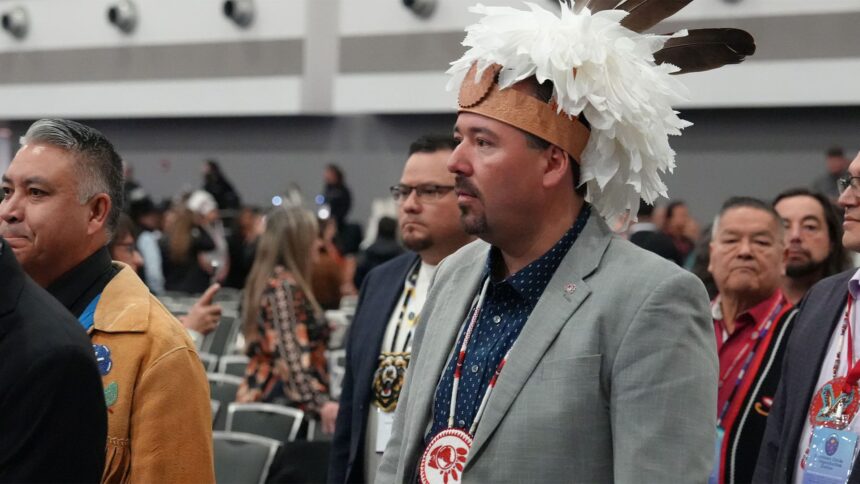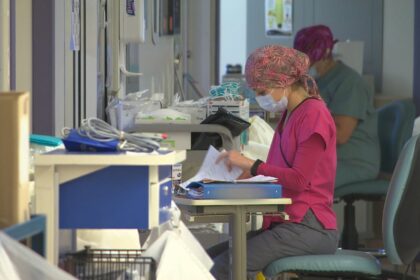The heads of the Chiefs of Ontario and Anishnabek Nation say a Parliamentary committee rescinded an invitation to address MPs regarding Bill C-5 – the federal government’s One Canadian Economy Act. Abram Benedict of the Chiefs of Ontario and Linda Debassigé told reporters they had originally been invited to testify but were later removed from the witness list. They said they were originally informed the committee would hold 12 hours of hearings beginning at 11 a.m., but were later informed they would no longer be able to present. “We’re told that ‘the committee has been shrunk down to three hours, the time that we gave you is no longer in that time and so we’ll see if we can find you any time in the three hours,’” said Benedict. Benedict said no explanation was provided for the shortened committee schedule, but he believes the government is deliberately trying to suppress opposition to the bill. The only First Nations leader permitted to speak before the Transport, Infrastructure and Communities committee was Assembly of First Nations National Chief Cindy Woodhouse Nepinak. A dozen chiefs sat silently behind her in the committee room, unable to address the committee directly. Only two days were allocated for committee hearings on Bill C-5, leaving extremely limited time for public testimony or feedback from First Nations and other stakeholders. Woodhouse Nepinak criticized the committee for failing to include more Indigenous witnesses. Her office told The Canadian Press that she had to lobby for a spot at the hearing, and was only granted one at the “last minute.” Bill C-5, officially titled One Canadian Economy: An Act to Enact the Free Trade and Labour Mobility in Canada Act and the Building Canada Act, would give the federal government sweeping powers to override existing laws — including the Indian Act and the Species at Risk Act — to expedite the approval of major infrastructure projects. The bill is being fast-tracked through the House of Commons this week as Prime Minister Mark Carney seeks to fulfill a campaign promise to boost nation-building projects by July. During her appearance, Woodhouse Nepinak told MPs that a dozen of chiefs seated behind her had come to be heard. “Deep consultation involves a two-way exchange of information sharing accompanied by substantive dialogue. It is more than merely inviting First Nations rights-holders to speak for five minutes or to make written submissions from a distance,” she said. “Consultation is not the Crown simply listening and going away and deciding on its own, without dialogue, without a back-and-forth on its content and scope of First Nations rights and corresponding Crown obligations under the Constitution, treaty or international law.” First Nation, Inuit and Métis leaders have warned that if their rights are not respected, the government could face court challenges and that blockades and protests are not off the table. Read More: ‘The honour of the Crown is not being upheld’: Indigenous leaders tell prime minister to start again with Bill C-5 First Nations need to ‘draw a firm line in the sand’ to get Ottawa to drop Bill C-5 says Wilson-Raybould Gull-Masty proposes applying an “Indigenous lens” to legislation. Indigenous Services Canada Minister Mandy Gull-Masty attends her first cabinet meeting on Wednesday. Photo: Mark Blackburn/APTN. Indigenous Services Canada Minister Mandy Gull-Masty said Carney is “super-open” to applying an Indigenous lens. In an interview on Tuesday, Mandy Gull-Masty, minister of Indigenous Services Canada (ISC) said she has asked the prime minister to screen all new federal bills and policies for their impacts on Indigenous communities. She noted that several ministries — including labour, justice, industry, and natural resources — introduce legislation that affects Indigenous rights and should be examined through an Indigenous lens. However, when APTN News sent five follow-up questions to Gull Masty’s office requesting details about what this process might look like, the department referred the inquiry to the Prime Minister’s Office. When APTN reached out to the PMO, a spokesperson responded with a link to the prime minister’s June 2 press release about C-5. To clarify, APTN sent a second, more detailed inquiry that asked if any conversations had taken place between Gull-Masty, the Indigenous caucus and the prime minister, as seemed to be indicated by Gull-Masty statements that the Prime Minister would consider applying an Indigenous lens to legislation. The spokesperson replied: “I will seek clarity. I am not privy on conversations at caucus, and much less at Cabinet, and could not comment on them even if I were. But I will get back to you.” No further response was received by the time of publication. With files from The Canadian Press. Continue Reading
Ontario Chiefs say their invitation to give evidence on national project debate was rescinded.

Leave a Comment










